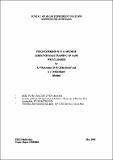| Abstract | Cane weevil borer, Rhobdoscelus obscurus (Biosduval) (Coleoptera: Curculionidae: Rhynchophorinae), is an introduced pest of sugarcane in Queensland, Hawaii and Fiji. It was accidentally introduced from Papua New Guinea about 1900 with sugarcane planting material (Veitch 1917). Previous research showed that male cane weevil borers produce aggregation pheromones which attract both male and female cane weevil borers. Three compounds emitted by feeding males were identified by Dr R Gries ata Simon Fraser University (see Robertson et al 1997). These compounds were synthetically produced by ChemTica Internacional SA and two of these, 2-methyl-4-octanol and 6-methyl-2-hepten-4-ol (rhynchophorol), were shown to be the active compounds for attracting cane weevil borer (Robertson et al 1997). The experiments reported here were designed to determine the optimum ratio of the two active compounds to attract cane weevil borer. In addition, the relative attractiveness of they synthetic lures was compared with that produced by feeding male cane weevil borers. Finally, a chemical known to increase trap catches of other species of Rhynchophorinae, ethyl acetate (marketed as 'Weevil Magnet'), was tested for its ability to synergise the attractiveness of the aggregation pheromones. |

